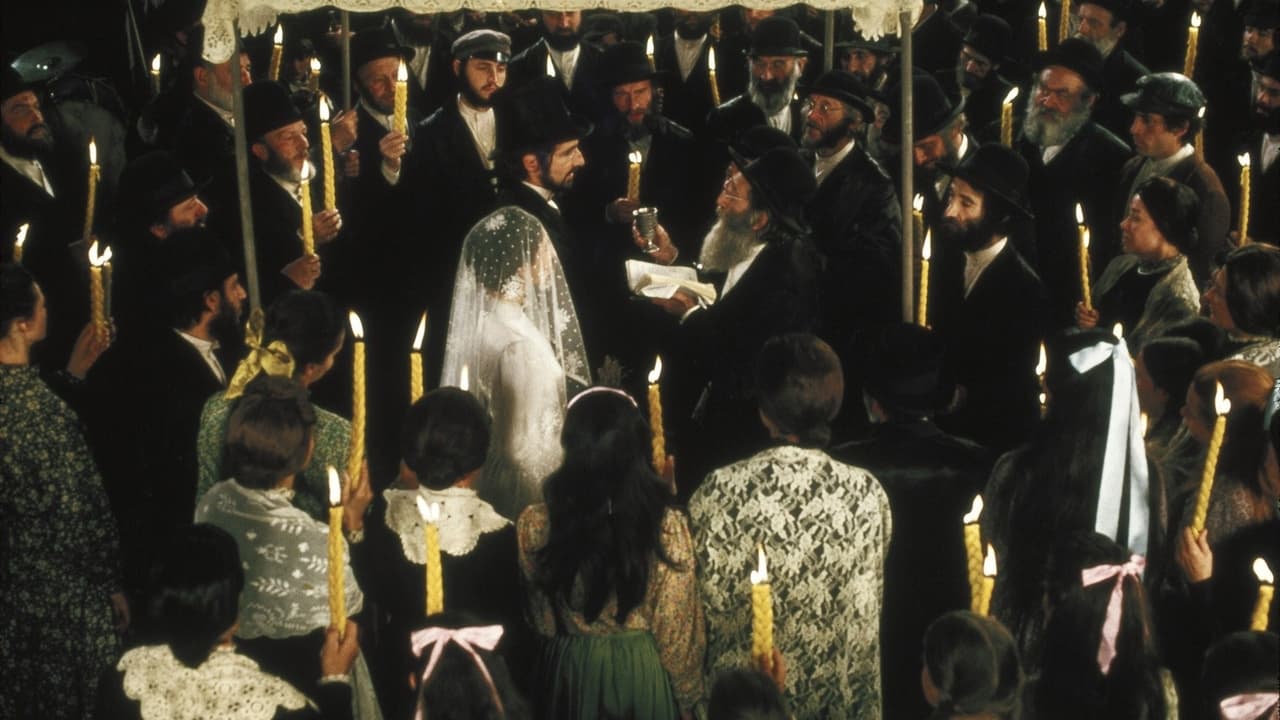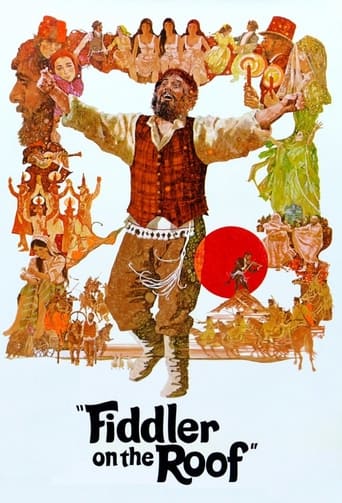

I am not generally a fan of musicals that have been adapted to the screen, but "Fiddler on the Roof" remains as one of the notable exceptions, thanks largely to the genius of director Norman Jewison ("In the Heat of the Night", "Moonstruck", "The Thomas Crown Affair, "Jesus Christ Superstar"), the endearing charm, vitality, and humanity of (Chaim) Topol, the ability of the rest of the cast to meet the elevated standard set by the lead, the innovative cinematography of Oswald Morris ("Lolita", "Oliver!", "The Entertainer", "Guns of Navarone") and the wonderful music, originally written by Jerry Bock and so capably adapted to the screen by John Williams.As to the excellent cast, note that there isn't one, single Hollywood superstar on the list, but they nevertheless succeed in creating one of the best musicals ever adapted to film and a movie that still survives on my list of favorites after many viewings. Personally, I would have loved to see Bea Arthur reprise her Broadway role as Yenta, but that's show business. Jewison's pick of Topol over Zero Mostel, however, was another one of his strokes of brilliance. Although Topol was mostly unknown outside of his native Israel, Jewison made a bold decision to cast him as Tevye, and this was only one example of the director's daring, innovative thinking that enhanced his directing and producing endeavors. He also agreed to cast Norma Crane as the female lead, Golde, who compliments Topol perfectly, even though I don't recall ever seeing her in a film other than her part as the mean and nasty town slut in "Tea and Sympathy" fifteen years earlier. Only Jewison had the ability to see her as "the perfect match" for Tevye. Right? Of course right!The story, based on the Yiddish short stories of Sholom Aleichem, is a familiar one for the Jewish people as they steadfastly struggle to hold to their traditions and values in the face of a rapidly changing environment that becomes increasingly hostile to their existence as both a religious and ethnic minority. As bad as conditions were for them during pre-revolutionary Russia and Ukraine, their situation would only worsen, especially when the Nazis came to power in Germany and conquered much of the rest of Europe only a few decades later.The fiddler in the play is a symbol of the perpetually precarious existence of Jews who have often depended upon the kindness of strangers throughout much of their thousands of years of history. Beyond the unique Jewish experience, the fiddler represents the universal fragility of all of our lives, regardless of our specific faith or ethnicity. Indeed, the uncertainties of life itself are like...they're like a fiddler on the roof!
... View MoreThe title comes from a painting by Russian artist Marc Chagall called "The Dead Man" which depicts a funeral scene and shows a man playing a violin on a rooftop. It is also used by Tevye in the story as a metaphor for trying to survive in a difficult, constantly changing world. The best musical numbers: "Tradition", "If I Were a Rich Man", "To Life", & "Miracle of Miracles". Each of the performances had their highlights, but Topol, who played Tevye, stood far above the rest. Without him, I am not sure the musical would have been as impressive. The entire film had a down to earth, farm life feel. Thus, I was not so shocked as amused when I discovered that the entire film was shot with a pair of brown nylon stockings over the lens. The weave can even be detected in some scenes. One of the most fun, playful musicals I have seen. Which made the sudden ending all the more depressingly stark in contrast.
... View More"It's hard to be Jewish, it's hard to be Jewish, it's hard to be Jewish in Russia, yo!" If this irreverent cutaway gag from TV's Community is indicative of Fiddler on the Roof's cultural presence in the 21st century (keeping in mind, this is the same generation that distilled Rent into "Everybody has Aids!" in 2004's cheerily crass Team America: World Police), it's a testament to how lovably unforgettable the story is to still incur such affectionate ribbing. But, endless revivals on and off Broadway aside, it's still primarily thanks to Norman Jewison's 1971 cinematic adaptation that the Fiddler flame continues to burn. The word 'timeless' is bandied about far too frivolously, but it's hard to find a more applicable candidate; more than 40 years after its release, the film is as infectiously watchable as ever. Furiously spirited and cunningly playful before revealing an underbelly of cavernous lamentation, Jewison's Fiddler on the Roof holds its place not only as one of the most unforgettable musicals of Classical Hollywood, but one of its most abiding, heartfelt delights. Like all the greatest musicals, Fiddler is timeless through its ability to translate an insightful glimpse into a specific sociocultural moment (the Russian-Jewish community uneasily navigating cultural persecution in pre-revolutionary Russia) into a swathe of universally relatable movie magic. From the opening number, where each reprise of "Tradition!!" brings more manic claustrophobia (thanks largely to Jewison's teasing editing, sonorously cutting between pieces of Jewish spiritual iconography to the beat), the film clearly establishes it will be doing everything in its power to poke at just that. Thankfully, the film's almost sitcom setup of each of beleaguered narrator Tevye's daughters (Rosalind Harris, Michele Marsh, & Neva Small; all slyly luminous scene-stealers) increasingly testing the boundaries of cultural transgression by marrying (gasp) for love always veers away from clichéd expectations enough to keep the film vibrantly unpredictable rather than the kind of saccharine staleness too many classical musicals dredge up. Instead, befitting the film's guiding metaphor, Jewison's directorial hand is steady as a rock. In spite of his film's voluminous run time and cascading emotional arc, balancing history, politics, and spirituality with humour, heart, and outrageously catchy musical numbers, Jewison's pacing is unflappably perfect. He finds an almost pristine level of cohesion, building each romantic crisis into the next in harmony with the brewing sociopolitical upheaval to circumvent any worries of episodic plotting. Similarly, his predilection towards the zaniness of his story not only infuses it with tremendous energy (just check out the expressionistic, ghostly insanity of Tevye's Dream to see Jewison's wackiness at full tilt), but makes the inevitable second half crash all the more agonizingly hopeless and despondent. Ahh, yes - that second half. Just as The Sound of Music is incomplete without its pesky Nazis, Fiddler's rumblings of "trouble in the city" come with eventual devastating consequence. Jewison wisely doesn't overplay the macro sociocultural turmoil, but merely sows seeds of revolt - a jab in the otherwise glib opening number ("we don't bother them, and so far they don't bother us"); a raucous engagement celebration turned heated cross-cultural dance battle, until escalating sharply with a bawdy matrimony turned hate crime arson. As silly as it gets, Jewison's Fiddler is just as unafraid to glare the horror of its historical atrocities straight in the face, until sputtering out with the crushing anticlimax of an enforced deportation, an ending too necessarily bleak to trivialize. Thankfully, Fiddler is too chock-full of unstoppably hummable tunes to ever become needlessly dour. The songs, naturally, are unforgettable enough to speak for themselves (though John Williams' rich, Oscar-winning background score does some considerable speaking of its own), so Jewison allows them to simply breathe, integrated into the narrative with such unceremonious muckiness that they feel all the more spontaneous and heartfelt when chirped by the mud-caked, visibly weary cast. In a more classical or more contemporary remake, the most iconic ballad, "If I Were a Rich Man," would be accompanied by deluges of glitzy Broadway production values and dazzling choreography. Under Jewison's grainy, no-bullsh*t 1970s sensibilities, it has Topol shimmying alone in a grungy barn, imitating the braying of the livestock surrounding him. Chicago or Broadway Melody this ain't, but it's all the more enthusiastically authentic for it.Still, if there's a single roof tile that keeps this Fiddler upright, it's the legendary performance of Topol. He doesn't so much play Tevye as allow him to ooze out of every pore. Every grunt from his entirely credible Russian accent, every exhausted sag or mischievous prance, every sheepish grin or world-weary grimace, every indignant booming of "TRADITION?!" is so effortless they seem worlds away from the affectations of an actor: this is a wholly fleshed out, loving, hurting, human being on screen in front of us, and we can't help but love him with the entirety of our hearts. The play's 'Tevye talking to the audience/God' conceit may have been a risky prospect to translate into film, but in Topol's effervescent hands, we're too delighted to be invited into his monologue to split hairs. Supporting him, Norma Crane proves both hilariously cantankerous and deeply sweet as Tevye's prickly wife Golde, and watching the two of them share an incredulously clumsy romantic duet is one of the most adorable moments ever committed to celluloid. Finally, Leonard Frey is hugely affable and goofy as the mousy suitor of Tevye and Golde's oldest daughter, while Starsky and Hutch's Paul Michael Glaser raises laughs aplenty as an endearingly self-righteous revolutionary turned romantic. Wonder of wonders, miracle of miracles - dispelling all fears of datedness, Fiddler on the Roof retains its worthy place as one of the essential, canonical movie musicals, sure to capture hearts and leave generations of audiences whistling "If I Were a Rich Man," no matter how they're prompted to experience it. After all, it IS, evidently, hard to be Jewish in Russia... yo. -10/10
... View More"A fiddler on the roof. Sounds crazy, no? But here, in our little village of Anatevka, you might say every one of us is a fiddler on the roof trying to scratch out a pleasant, simple tune without breaking his neck. It isn't easy. You may ask, 'Why do we stay up there if it's so dangerous?' Well, we stay because Anatevka is our home. And how do we keep our balance? That I can tell you in one word: tradition!" That quote sums up the genius of this film. From an artistic standpoint, there were some plot elements and character developments I didn't think were totally needed. They do however drive the story, which seemed to be their purpose, so I can accept them. The urge to just walk away almost got me a couple of times. But, in the end, this is an excellent character study.
... View More